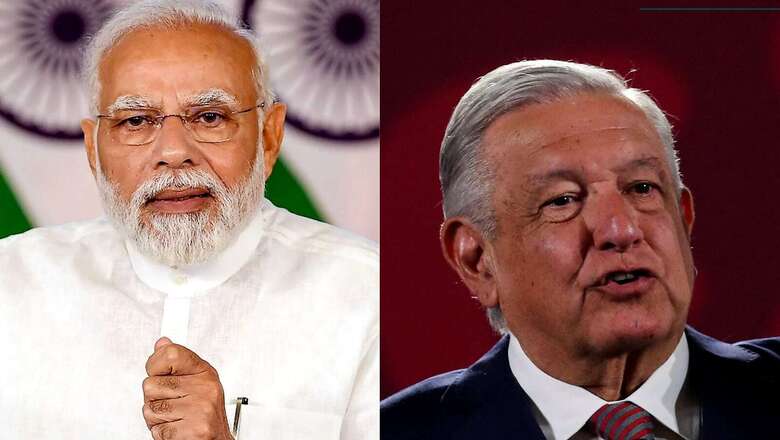
views
As the world is witnessing the recurrence of a Cold War-like situation, with Russia, China, the United States, and Europe picking sides, one person has risen above this bandwagoning and emerged as the true global leader. His motto of ‘Sabka Saath, Sabka Vikas’ has won him the place he deserves in the global context today. It is none other than the Hon’ble Prime Minister of India, Narendra Modi.
Mexico’s President, Lopez Obrador, recently proposed that an international commission be formed to promote world peace without war or trade wars for the next five years. The following three members have been proposed to the United Nations: Pope Francis, who is seen as a symbol of peace and humanity; United Nations Secretary-General António Guterres, with the UN as the only organisation in the world, post the Second World War, to maintain peace and security; and the Prime Minister of India, Narendra Modi, who believes in the idea of Vasudhaiva Kutumbakam (World is one family). This move is an indication that PM Modi’s foreign policy and its imprint are clearly visible in the global scenario today.
As envisioned by PM Modi, India is now gaining international recognition for its foreign policy. His leadership has changed India’s international image. There have been many instances when India has been able to balance critical international situations in the best possible manner without compromising its national interest or the overall well-being of its people, whether it has been dealing with the pandemic, the Ukraine crisis, or undertaking development activities in the African continent and supporting Sri Lanka in dealing with its economic crisis.
India’s Foreign Policy under PM Modi
India’s neighbours
PM Modi has prioritised his neighbours since taking office in 2014. This was demonstrated by breaking tradition and making history by inviting SAARC countries to the swearing-in event.
India has been proactive in providing all possible assistance to her neighbours in times of distress. For example, when China began its expansionist policy in the region around Chumbi Valley in 2017, it stood next to Bhutan. Back in 2018, India quickly offered a $1.4-billion financial package to assist the Maldives to bail it out of China’s debt-trap diplomacy.
Even as recently as this year, with Sri Lanka experiencing one of the worst economic crises in history, largely due to Chinese debt-trap diplomacy, India extended its support for the island nation, despite certain moves by Sri Lanka against India, such as the scrapping of the East Container Terminal deal.
With greater emphasis on India’s Act East Policy, PM Modi’s foreign policy has clearly stated the importance of Southeast Asian countries. India has begun a variety of development activities in Cambodia, including the restoration of culturally significant sites and the development of regional connectivity, such as the IMT highway.
India and West Asia
India’s relations with this region have strengthened like never before under PM Modi’s leadership. Using his excellent soft power diplomacy, India has managed to balance several issues unique to this region of the world. It has maintained a balance in its relations with Arab countries, Iran, Palestine, and Israel. Under PM Modi’s leadership, Israel and Palestine could be de-hyphenated. He earned a much-deserved reputation for his handling of West Asia politics. In response, the Israeli Air Force provided a flying escort for the Prime Minister’s visit to Ramallah. Further, the UAE honoured the Prime Minister with its highest civilian award and signed a comprehensive trade and economic agreement with India as equal partners without India being compromised.
Along with that, on lines of Quad, India went on to become a part of I2U2, popularly known as West Asia Quad, to have stable and free movement in the Indian Ocean Region.
India and the Indo-Pacific countries
The last eight years under PM Modi have seen numerous changes in India’s foreign relations with this region of the world. The United States openly acknowledges India’s critical role in bringing security and stability to the Indo-Pacific region. It went on to form Quad, which included India as a member. Despite India’s good relations with Russia and the sanctions imposed on it as part of CAATSA, no such sanctions were imposed on India when it went ahead with the S-400 missile system deal with Russia.
Despite mounting pressure from the West to take a stand on the Ukraine crisis or to support sanctions against Iran or Russia, India handled the situation in a measured manner. Without taking either of the sides, non-alignment was the approach followed by her.
The Modi government’s reforms and realistic policies enticed several Western countries to sign trade agreements with India. Australia was the most recent addition to this list. Unlike in the past, both parties agreed on equal terms during the negotiations. The United Kingdom and Canada are soon to join this list.
Europe and other Eurasian countries
India has maintained positive relations with several European countries, especially France. The International Solar Alliance was founded by both countries in 2015. France has consistently supported India’s bid for a permanent seat in the United Nations Security Council. Post-Brexit, relations with the United Kingdom are strengthening, as are relations with the European Union.
Under PM Modi, India has prioritised developing ties with Central Asian republics and the Commonwealth of Independent States through development activities such as TAPI, as well as developing ties with countries like Belarus.
India decided to work towards its Act Far East policy as part of its deeper ties with Russia. Both India and Russia agreed to invest in this part of the region during the 20th India-Russia Annual Summit in Vladivostok to further strengthen ties.
Despite the Ukraine crisis, India was the only country that was able to hold talks with both parties and facilitate Operation Ganga, which evacuated Indians from Ukraine’s conflict zones.
Other developments under PM Modi
Aside from these relationships, India has taken the lead in becoming the voice of the unheard. India has repeatedly emphasised the importance of addressing the issues of small and vulnerable countries, which is why, when China refused to supply vaccines to Uruguay, India quickly stepped forward to assist the country in need.
During the pandemic, India’s role as a global leader was clearly visible. As part of Vaccine Maitri, India assisted vulnerable countries in overcoming adversity. India and South Africa had asked the World Trade Organization to waive off intellectual property rights related to Covid in order to ensure that vaccines and medicines were available and accessible to small and vulnerable countries.
PM Modi’s leadership has been instrumental in shaping India’s foreign policy. Having shed off its appeasing attire, India has become more assertive today. At a time when the world’s leaders are fighting over territories, resources, and power, India is continuing its journey of realising the goal of ‘Vasudhaiva Kutumbakam’, without compromising its national interest or overall well-being.
Nupur Bapuly is a PhD in International Relations from Jawaharlal Nehru University. She is currently working as a policy analyst in a think tank in New Delhi. The views expressed in this article are those of the author and do not represent the stand of this publication.
Read the Latest News and Breaking News here




















Comments
0 comment